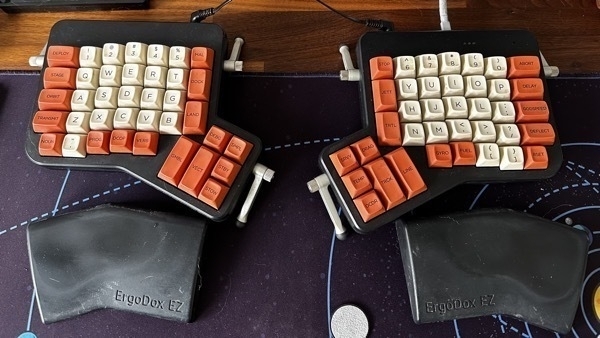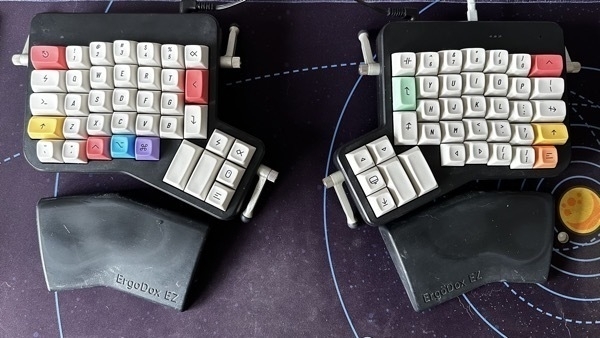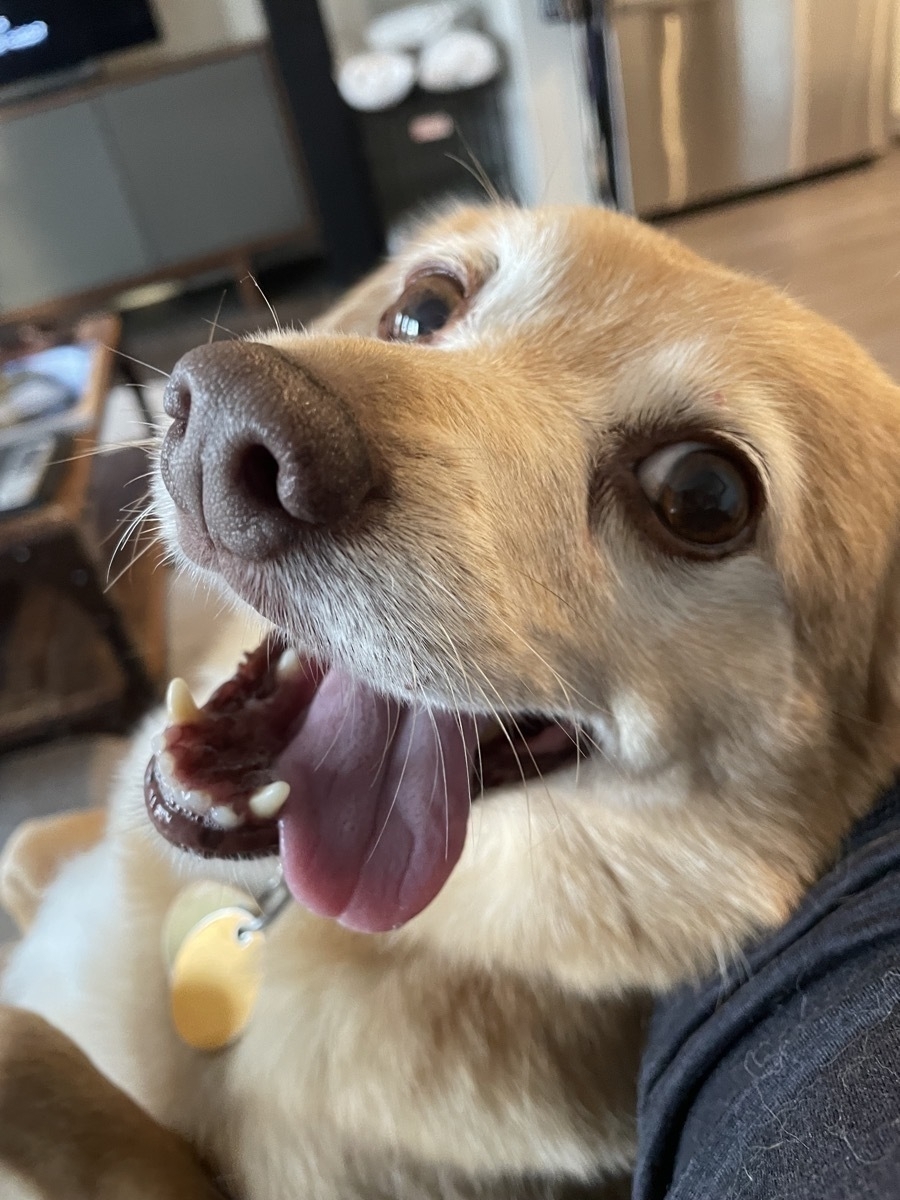As a reminder, this month I’m also writing Jarrod letters.
Hi Jarrod,
Thanks for the kind words.
At home, my world is ruled by my dogs. Gracie is a 13 year old Pomeranian-Beagle mix. We got her when she was about 8 months old, right as Elsa and I were going to start living together. In fact, the weekend I closed on my first condo was the weekend Elsa picked up Gracie. A month or so later, Gracie mostly moved in with me and Elsa was shortly behind. She was my first dog since my childhood dog passed away while I was in college. She’s intelligent, loyal, and loving. This summer is almost certainly her last, and we’re doing our best through a lot of money and care to give her as much quality time left as possible. A few weeks ago we thought that would be long gone by now, but I’m happy she’s rebounded pretty well at the moment, so we’re just trying to enjoy our remaining time.
Brandy is a terrier mix of some kind. She moved in with us when Elsa’s mom, also Elsa, moved in with us 7 or so years ago. At the time, she was about 2 years old. She is mostly deaf, very low energy, and incredibly caring. She will take constant rubs, and will kiss you endlessly if you let her. She’s a true lap dog.
Martina was my dog growing up, who we got when I was 4 or 5 and had for a little over 14 years. She was much larger (70-80 lbs, versus Gracie’s 20-21 and Brandy’s 16) and a yellow lab/golden retriever mix. She was a classic American family dog of her breed. My parents never got another dog after her, to my father’s disappointment. As a result, they love Gracie about as much as we do.
So what about the work world? What is “education-finance-technology”? Well, as it turns out, most finance and accounting software is built for finance and accounting people. And it’s mostly built for large businesses or “public sector” in a broad way. But it turns out, schools have lots of specialized needs and there are tons of people in school districts— principals, central office department heads, school board members, and even teachers— that need to be involved in decisions about how we spend public dollars to impact kids. So we sit on top of all that software that’s specialized for GASB accounting and treasury functions and do analytics, budget planning, and resource allocation modeling that makes sense to everyone who didn’t get a degree in financial management. Most of what we build is behind log ins and not super shareable, but this year we built a transparency portal for the state of Arizona that’s pretty cool if you want to poke around.
Being a part of something from the beginning is pretty special. I feel fortunate, not just because I was there early, but because I feel like we built this company deliberately (and sometimes far too slowly) such that I have experienced running a company at three or four distinct phases. I know what it’s like when everyone is an individual contributor doing everything. I know what it’s like when you first start to put a team together and figuring out basic people-management and collaboration. I’ve experience building a company to more than one team that has to collaborate across functions. And lately, I’ve been working on scaling my own function to many smaller teams working independently and collaboratively. So many of the folks I know who have worked for start ups get in when things are pretty good and spend a huge portion of their time hiring as they just keep growing. I feel like I actually learned how to run things. I think if I started at a company with 100 people that scaled to 1000 two years later, I would have learned significantly less about leading teams and managing people and how to build and execute on strategy. In fact, I’m pretty confident I could lead a team that had hundreds of people in total because of what I’ve learned here.
I don’t talk a ton about my work. I don’t think I feel like I’ve found my voice as a product leader outside of my job. In many ways, I can do what I do because of subject matter expertise. But I’m starting to get myself comfortable with the idea that I’ve built up skills specific to product management and even CTO-type skills, since I’ve been managing the engineers for 5 years (maybe more?) now.
I do think a way of bringing passions together is the key to success. Being a mountain guide is something you can bring to your site that no one else could. Maybe “bringing together” just means putting them side by side, two paths running in parallel, never meeting. Maybe there’s a way to braid the two lines together at times. For example, what does it mean to build community among mountain guides and enthusiasts? Where are those folks? How does being outdoors or at the gear shop influence your time with technology, or ability to be without it?
I wonder, as a mountain guide, do you build expertise on particular trails or a particular place? For you, what’s the balance between experiencing somewhere new and exciting versus a deep relationship to a single place? Maybe there are some parallels to my experience getting the time to experience different phases and sizes of my company versus simple scaling the experience of being a guide in a particular place versus further exploration. Maybe not.
I look forward to finding out.
Jason
Hey Jason,
It sounds like you enjoy a pet-heavy home. In my opinion, the best kind of home. Animals — particularly the ones that you can tell actually care about you — bring a sense of welcoming and belonging to a place. Judged by the sheer amount of time spent there, my pets are the true owners of our house. And they’re always visibly happy when my wife or I come through the door. They welcome us, and everyone else, in with attention and affection. We, humans, could learn a few lessons from our pets.
Gracie and Brandy sound like such sweethearts. That Brandy is “a true lap dog” rings true here. Our Golden Retriever, Phin (Phineas), loves nothing more than to be snuggled up with us. He’s about four years old now, but seems to think he still has the body of a much younger, smaller dog. He’s goofy, rambunctious and protective, but also a scaredy-cat, lazy and pampered. He contains multitudes. My wife and I got him as a puppy about a year into our marriage.
Ollie (Ollivander) is our Maine Coon cat that we’ve had together since back in 2015 when we were dating, but he also seems to think that he’s a dog. He chatters back and forth with us, will (sometimes) walk on a leash, and used to play fetch before doing so would get him pounced by the real dog. He’s the sweetest, most loving and affectionate cat I’ve ever come across. If he can see you, he’s purring. If he’s close enough, we’ll rub his face on yours. And although he’s coming up on his ninth birthday, he looks and acts as young as he ever did. I’m convinced he’ll live forever.
Our final pet is Remus the turtle. I picked him up (literally, off the ground while on a hike) when I was doing an internship down in Alabama in 2014. I was desperately lonely in a new state, living all by myself in a house that would usually have housed nearly a dozen interns. I needed someone — well, some thing — to talk to, and happened to spot a baby turtle. I’d wanted a turtle since I was a young boy, so he came home with me.
Remus, like my other pets, has lived through an identity crisis. You see, I thought he was an aquatic turtle when I first picked him up. So for the first few weeks of his life with me, he lived in my bathtub with a little rock to lay on until I could get him a proper tank. And then when I got a tank, I likewise mostly filled it with water. He seemed to thrive! He would even sleep underwater. But, as you can probably guess, Remus is not an aquatic turtle. He’s an Eastern Box Turtle, which, despite the name, is a land tortoise. When I finally realized that and switched out his living environment, he did seem happier. But I think he sometimes misses his swimming pool. He was a personable young turtle, very curious and cuddly. Not words I ever know to be associated with turtles, but he was! These days he’s going through what I think is his teen years and is being, in a word, an asshole. I hope he’ll grow out of his grumpiness, and will perhaps be happier again when we can move him into a bigger habitat when we move to our new home soon.
Wow, I didn’t expect this letter to turn into pet central, but here we are!
Your work sounds really important. Many professions and industries seem inaccessible to outsiders because their language and processes are so specific. For example, the medical field, law, software development, and, as you say, finance, are all black boxes. We put things in, we get things out, but your everyday person probably doesn’t have any sort of understanding about how it actually works. Building tools that are more accessible to the public must help them out, but — I imagine — also make the work of finance professionals more pleasant. Kudos to you!
Do you have aspirations to lead a bigger team of your own, perhaps at a different company as a new challenge? The way you talk, it sounds like you feel competent to do so. Does that confidence get you wondering if you should try?
Thank you for your insightful recommendations about blending my interests to showcase on my site. I think you’re right, I don’t see a lot of outdoor and tech enthusiasts out there. Perhaps this isn’t quite what you were suggesting, but maybe the key idea is just to write more about what I’m doing, things I’m trying out, and what’s working. I think, perhaps, I’ve been putting too much pressure on needing an angle for my writing. (Related, I feel conflicted about having two places to write, in general.) Maybe my writing would flourish if I aim for it to be less about what’s “right” and more just about me.
Since I’ve been guiding here in the Adirondacks for only as long as we’ve lived here (about a year and a half), it seems like I often get to experience new and exciting places right alongside my clients. Everywhere is new! That novelty will wear off. In fact, it’s starting to as I begin to take clients on the same key hikes or climbs here — the ones that have a particularly friendly approach or offer a wide range of opportunities for folks at various skill levels. But what’s never the same are the people. They each bring their own unique blend of history, interests, ambitions, challenges, and talents. I love sharing my passion for the outdoors with others, and try to inspire some in them.
But to keep things fresh, I do personal trips with friends and other locals. I never want to guide something that’s at the edge of my ability level, so I always feel like I’m holding back to a degree with clients. That’s a good thing because it means I have some margin to get us out of sticky situations should they arise. It also means that if I want to challenge myself, I can try crossing the same terrain faster, link hikes together to push the mileage, or try for climbs that get me a little scared. And I feel like there’s so much opportunity, even just here in the ADK, that I’ll never run out of things to try.
Thanks for coaxing these thoughts out of me.
Following that train of thought, I’d love to hear — if you’re willing to share — about some things that scare you and how you deal (or don’t deal) with them.
Until next time,
Jarrod




